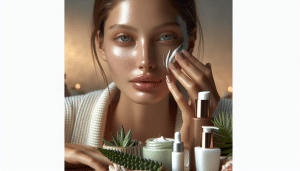Unlocking the Science of Glowing Skin
Natalie Brooks October 30, 2025
Curious about achieving a healthy glow? This guide reveals the secrets behind radiant skin with evidence-backed insights, from nourishing routines to lifestyle tweaks. Explore the science, nutrition, and practical tips that can help support your complexion’s vitality.
The Foundations of Healthy Skin Radiance
Glowing skin has become a modern beauty aspiration, often featured in social media trends and wellness campaigns. The concept goes beyond superficial beauty, touching on deeper aspects of health and self-care. Skin radiance is influenced by hydration, sleep, and consistent skincare routines that work compatibly with one’s unique skin type. According to dermatological studies, even subtle environmental factors like air quality and humidity significantly impact skin’s luminosity and texture, making tailored care essential (https://www.aad.org/public/diseases/a-z/caring-for-your-skin).
Maintaining radiant skin starts with understanding the skin barrier, which acts as the front line for moisture retention and environmental protection. A healthy barrier reduces water loss and shields against external pollutants. Using products with ingredients like ceramides and hyaluronic acid helps fortify this layer, reducing the risk of dullness and irritation. Researchers emphasize that harsh cleansers and frequent exfoliation can compromise this protective barrier, leading to increased sensitivity.
Balanced nutrition, lifestyle factors, and adaptive skincare habits all contribute to improved skin radiance. Drinking enough water and following a nutrient-dense diet filled with antioxidants are foundational. Avoiding tobacco smoke and limiting exposure to environmental stressors is also recommended. Recent developments suggest that gentle, non-abrasive skincare and sound sleep hygiene combine to support that much-sought-after glow. Thoughtful self-care truly starts with thoughtful choices.
The Role of Nutrition in Skin Glow
Nutrition’s impact on skin health is both direct and profound. Diets rich in antioxidants, healthy fats, and phytonutrients may help promote elasticity, resilience, and brightness. Vitamin C, for instance, is known to support collagen synthesis—an essential element for a firm, supple complexion. Foods such as citrus fruits, bell peppers, and leafy greens are often recommended to naturally boost cellular renewal and radiance (https://www.hsph.harvard.edu/nutritionsource/vitamins/vitamin-c/).
Omega-3 fatty acids, present in fatty fish, walnuts, and flaxseeds, have been studied for their ability to maintain moisture balance and reduce inflammation. Research points to the valuable role of these nutrients in managing common conditions like dryness and redness, both of which can make skin appear lackluster. Additionally, polyphenols in foods such as berries and green tea provide powerful antioxidant properties that help defend skin against environmental damage.
While diet alone won’t guarantee instant transformation, gradual, consistent changes deliver lasting benefits. Avoiding highly processed foods and limiting added sugars is linked to better skin texture and tone. Some individuals notice improvements in radiance within a few weeks of modifying their eating patterns. The journey toward glowing skin is not just about topical products; it starts in the kitchen and reflects holistic wellness choices.
Effective Skin Care Routines for Luminous Complexion
Building a personalized skincare routine can enhance the natural luminosity of skin by addressing specific needs. Cleansing is the first step: dermatologists advise using a gentle cleanser to remove impurities without stripping natural oils. Following this with a hydrating toner can help balance pH levels, preparing skin to absorb the benefits of serums and moisturizers. Layering products from lightest to heaviest allows for better absorption and results (https://www.ncbi.nlm.nih.gov/pmc/articles/PMC3673383/).
Incorporating products that contain ingredients like vitamin E, niacinamide, and hyaluronic acid can address common concerns from dullness to uneven texture. Regular exfoliation—no more than once or twice per week—removes dead skin cells, promoting surface renewal. However, gentle exfoliators are best, since over-exfoliation may trigger sensitivity and disrupt the skin barrier. Hydration is key throughout every step, encouraging dewy, soft skin.
Sun protection is a non-negotiable aspect of achieving and maintaining a radiant complexion. Using broad-spectrum sunscreen daily shields skin from UV damage, the leading cause of premature aging and uneven pigmentation. Layering a lightweight SPF after morning moisturizing brings both immediate and cumulative benefits, supporting long-term skin health. With consistency, these daily practices yield visible improvements and help sustain a vibrant, glowing look.
Lifestyle Habits for Enhanced Skin Vitality
Lifestyle choices contribute as much to glowing skin as skincare and diet. Prioritizing sleep is essential; overnight, skin cells go through renewal and repair. Experts recommend setting a regular sleep schedule and creating a calming bedtime routine to support this process. Chronic sleep deprivation is closely linked to increased signs of aging and dullness, highlighting the importance of rest for beauty and wellness (https://www.sleepfoundation.org/physical-health/how-sleep-affects-your-skin).
Managing stress is another vital factor. Prolonged stress triggers the release of cortisol, a hormone that negatively affects skin’s appearance. Mindfulness practices, gentle exercise, or calming hobbies may help mitigate these effects, promoting a calm, even-toned complexion. Social interaction, joyful activities, and regular physical movement can each play a role in fostering inner balance, which often shows up as outer radiance.
Environmental elements, such as weather, pollution, and blue light, also influence skin health. Using antioxidants in skincare and wearing protective clothing outdoors can minimize exposure-related dullness. Even adjusting indoor humidity—using a humidifier in dry seasons—reduces transepidermal water loss. Together, small lifestyle shifts have the power to gradually but noticeably improve vibrance and clarity.
The Truth About Popular Glow-Boosting Ingredients
Consumers often encounter a wide range of ingredients marketed to enhance skin radiance. Vitamin C serums, retinoids, and botanical extracts like licorice root have all gained popularity. Vitamin C, in particular, is supported by robust evidence for reducing hyperpigmentation and improving skin brightness. Retinoids, derived from vitamin A, are celebrated for their role in boosting collagen and smoothing fine lines, though they may require a gradual introduction to avoid irritation (https://www.ncbi.nlm.nih.gov/pmc/articles/PMC2699641/).
Botanical antioxidants, such as green tea extract and niacinamide, work to fight free radicals and soothe irritation. These ingredients have become commonplace in many formulas, thanks to scientific research supporting their efficacy. Hyaluronic acid is another favored ingredient, celebrated for its ability to hold many times its weight in water, leaving skin visibly plumper and more hydrated. Careful selection and patch testing remain advisable, as individual sensitivities vary.
Marketing hype around glow-boosting products can sometimes outpace available evidence. Experts stress the importance of patience and consistency when using these compounds. Unlike dramatic one-time treatments, most ingredient benefits accumulate gradually over several weeks. Reliable routines, combined with evidence-based ingredients, often bring more lasting rewards than rapid, high-turnover trends.
Natural Self-Care Practices for Radiance
Beyond products, simple self-care rituals can help elevate the skin’s natural glow. Gentle facial massage encourages lymphatic drainage, promoting de-puffing and subtle sculpting. Weekly face masks—using mineral clays, honey, or oatmeal—may comfort sensitive skin and supply essential nutrients. These routines foster moments of relaxation while supporting the skin’s resilience (https://www.health.harvard.edu/staying-healthy/skincare-for-the-future).
Staying physically active is another pillar of holistic skincare. Regular movement boosts circulation, bringing oxygen and nutrients to the skin. Yoga, walking, or gentle stretching enhance flexibility and provide stress relief, both of which are visible in a calm, illuminated complexion. A mindful approach to sleep and hydration rounds out these practices, highlighting their cumulative effect on wellness and beauty.
Minimizing negative habits, such as excessive alcohol or late-night screen time, supports the body’s regeneration process. Replacing these with mindful breathing or enjoying herbal tea before bed promotes deep rest and overnight skin repair. As awareness of self-care continues to expand, many are learning that true radiance begins with a kind, nurturing approach to daily habits.
References
1. American Academy of Dermatology. (n.d.). Caring for your skin. Retrieved from https://www.aad.org/public/diseases/a-z/caring-for-your-skin
2. Harvard T.H. Chan School of Public Health. (n.d.). Vitamin C. Retrieved from https://www.hsph.harvard.edu/nutritionsource/vitamins/vitamin-c/
3. Draelos, Z. D. (2012). Skin care products for women: A review. Journal of Cosmetic Dermatology, 11(1), 77-84. Retrieved from https://www.ncbi.nlm.nih.gov/pmc/articles/PMC3673383/
4. Sleep Foundation. (n.d.). How sleep affects your skin. Retrieved from https://www.sleepfoundation.org/physical-health/how-sleep-affects-your-skin
5. Mukherjee, S., Date, A., Patravale, V., Korting, H. C., Roeder, A., & Weindl, G. (2006). Retinoids in the treatment of skin aging: An overview of clinical efficacy and safety. Clinical Interventions in Aging, 1(4), 327–348. Retrieved from https://www.ncbi.nlm.nih.gov/pmc/articles/PMC2699641/
6. Harvard Health Publishing. (n.d.). Skincare for the future. Retrieved from https://www.health.harvard.edu/staying-healthy/skincare-for-the-future








